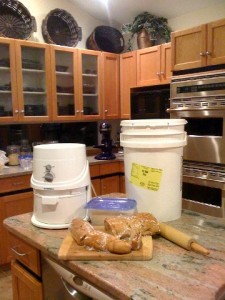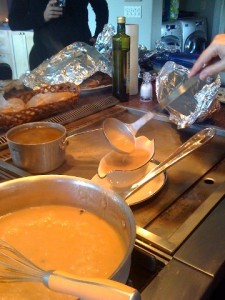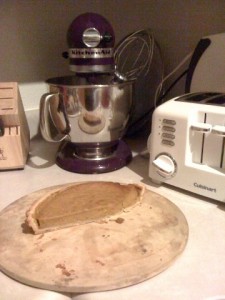
The first part of the flour experiment - make my own bread.
Here is the story of how I got into milling my own flour from wheat.
Project Initiation
I was watching the Green Channel on the reality show where the families are living on food they can get within 100 miles of their homes. The biggest challenge they were facing was how to make their own bread as the wheat was hard to come by. A natural foods grocery store was able to get them the whole wheat berries, but they had to grind the wheat themselves. The bread they made was dense and coarse. I thought back to this book I had recently read called the “Blue Zones” – its about areas of the world where people live the longest. I remembered the mountain people of Sardinia. The men lived the longest – they primarily ate the local cheese and locally made bread that was made with locally grown wheat. Then I recalled all the research I have done on how food impacts learning – we have our students eat a diet of complex carbohydrates and protein to improve their ability to retain a lot of information in a short period of time. As simple carbohydrates found in highly processed foods spike blood sugar which increases the brains beta state and makes it harder to stay calm, relaxed and focused in tense situations. I was thinking, maybe, just maybe the reason why people are getting fat in the very developed parts of the world is that they are eating too much of the simple carbohydrates – and NOT because they have a self-discipline deficiency. But because it takes much more of that type of food to get the proper nutrition that the body needs. I recalled reading something that people rarely overeat meats, cheese, fruits, and vegetables – they get satiated on reasonable portion sizes of those foods. HOWEVER, people routinely overeat commercially processed breads, cakes, cookies, candies, pastas, white rice. COULD WE BE EATING TOO MUCH OF THIS STUFF BECAUSE OR BODIES ARE TRYING TO GET THE PROPER NUTRITION?
So I thought, let me experiment on myself. I have tried diets such as the Atkins diet, the south beach diet – these severely restrict your carbohydrate intake. Over time I just felt like I was missing out on too much of life to stay on them. When I took a four month sabbatical last year, I lost 30 pounds just by eating more of the food I made myself and relaxing. Since I neither want to take off four months again, OR severely restrict my consumption of the staff of life – bread – I figured, let me see what happens to my food craving patterns if I make my own flour from wheat like the folks did on the 100 mile experiment. I’m pretty healthy to start with – so I’m doing something right already – but I don’t eat that much bread and after reading the Anti-Cancer book last year, I do my best to stay away from refined sugar.
Project Plan
To start with – I needed to get a machine to grind the wheat berries into flour. I talked with a friend of mine who’s mom has been grinding her own wheat for years. His biggest complaint was the bread was too dense and coarse. So I was committed to making bread that was lighter. Dense and coarse bread is nice as a novelty and to use for making toast – but I prefer lighter breads for sandwiches. I found the Pleasant Hill Grain company via google, and ordered the the Nutrimill Grain Mill that could do fine or coarse grinding on the wheat.
On the Pleasant Hill Company site they also have a variety of types of wheat for sale (they are located in Nebraska – but I am not doing the 100 mile challenge). On the grains section of their site they give a whole explanation of milling your flour right before you use it as that preserves the most nutritional value of the wheat. Per their recommendation, I ordered the hard white and the hard red wheat berries.
I ordered this all a week before I went to Italy. It didn’t make it to my house before I left. Which I guess now is a good thing – there is no way I would’ve had time to eat the bread before I left AND you’re only supposed to mill the flour that you need – right before you need it.
Project Execution
When I got back from Italy – my mill and wheat were waiting for me at my house. The wheat shows up in these five gallon buckets that protect it from bugs and rodents. They also protect it from YOU. It took me about an hour to get the wheat container opened. I definitely burned a lot of calories trying to get the lid off the wheat.
I had also learned in Italy – that when eating very simple foods that were made fresh, I did actually lose weight while spending a lot more time eating. So the experiment was well underway, accidentally.
I went to work milling my first round of flour. I had managed to open the hard white wheat berries so that was what I was going to use. I made my standard bread recipe:
1 Package yeast
1 cup warm water
1 TBS honey
Proof the yeast – this means you mix the yeast, water, and honey and wait to see if the mixture starts to bubble – when it does, the yeast is viable and ready to use.
Add
1 tbs good cooking oil
1 egg
1/2 cup of walnuts (I like nuts in my bread)
enough flour to make an elastic dough (the amount is really dependent on the flour).
I use a kitchen aid mixer with a dough hook. When the mixer engine starts to smoke, I take the dough out of the bowl and knead it by hand for another 5 – 10 minutes. Kneading the dough is very important as it gets the wheat to release gluten that feeds the yeast and makes the dough rise.
Next, I lightly oil the bowl, put the dough back in the bowl, cover it with a clean kitchen towel, and put it in an unheated oven with a pan of water that has been boiled on the stove. This creates a nice warm moist environment for the yeast to work it’s magic on the dough.
I let it rise until the dough is double in volume. Since this was an experiment, I had no idea how long that would be. It took about three hours.
Punch down the dough, roll it out and make it into whatever type of loaf you would like. I divided the dough into two sections and made a baguette and a typical loaf of bread. For the typical loaf of bread, I rolled it out with a rolling pin, put cranberry sauce on it and rolled it back up.
Boil the pan of water again, and put the loaves back in the oven to rise.
I had to go to several meetings so they were left to do their thing on their own for six hours. When I got home, they had again doubled in size and were ready to cook.
I cook bread in an oven about 350 – 375 degrees for about 30 – 45 minutes. To test for doneness – you tap on the top of the bread – if it sounds hollow, it is done. The baguette was done in 30 minutes, the regular loaf, 45 minutes.
Project Control
Well here was the moment of truth on this experiment. The baguette was great – I had one slice and was stuffed. Too full to eat a piece of the cranberry swirl loaf. So I waited until the morning and had a piece of the cranberry swirl loaf for breakfast. The bread has somewhat of a “nutty” taste – duh – I had put in walnuts. The texture is denser than store bought bread, but still light. And since I did the fine grind, the bread is not coarse – it’s more like the texture of a sponge cake. There is no sandy gritty feel to this bread.
Lets see how long it takes me to get hungry after I had that piece of bread. Typically after a bowl of cereal, I’m hungry about 2 to 3 hours later. I did only eat one slice of the bread. Usually when I have toast, I have two slices of bread. Right now, I am too full for another piece of that bread, or anything else for that matter.
Project Closeout
This flour is very slippery when it gets on the floor. I’ve cleaned up the kitchen – it was getting kind of dangerous with that fine powder on the floor. Next I might try to use the flour to make my own pasta. I have to remember that you need to mill the flour right before you are going to use it to have the most nutritional value. I’ll be giving the flour I’ve already milled to friends and family as I did go a little overboard with the milling machine – I wanted to see what type of loading the machine could take (better to find out before the warranty ran out). It worked just fine through several hours of use.











